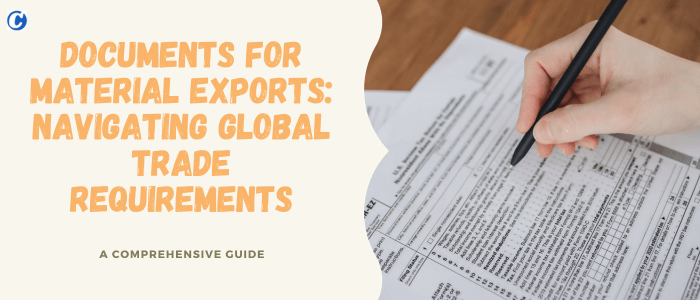Essential Documents for a Smooth Material Export Process: A Comprehensive Guide- Exporting materials is a crucial aspect of international trade and commerce. Whether you’re a manufacturer looking to expand your market reach or a logistics manager handling shipments, understanding the necessary documentation for material exports is vital for a successful and compliant operation. In this blog post, we will explore the key documents required for a seamless material export process.
What are the Documents for Material Exports
In the ever-expanding realm of global trade, the export of materials plays a pivotal role in supporting industries, businesses, and economies worldwide. Whether you’re a seasoned exporter or venturing into international markets for the first time, understanding the essential documents required for material exports is fundamental to your success.
These documents serve as the backbone of your export transactions, facilitating smooth customs clearance, ensuring compliance with international regulations, and minimizing the risk of costly delays. In this comprehensive guide, we will explore the key documents you need to have in your arsenal to navigate the intricate landscape of material exports effectively.
Whether you’re shipping raw materials, industrial components, or finished products, this blog will equip you with the knowledge to streamline your export processes and expand your global reach with confidence.
Essential Documents for Material Exports:
- Proforma Invoice
- Commercial Invoice
- Packing List
- Certificates of Origin
- Certificate of Free Sale
- Shipper’s Letter of Instruction
- Inland Bill of Lading
- Ocean Bill of Lading
- Air Waybill
- Dangerous Goods Forms
- Bank Draft
- Inspection Certificates
- Importer’s Documents
- Phyto-sanitary certificates and fumigation certificates
Commercial Invoice
The commercial invoice is one of the fundamental documents in any export transaction. It serves as a bill of sale and includes essential information such as the description of the goods, quantity, unit price, total value, and terms of sale. Customs authorities in both the exporting and importing countries use this document to assess duties and taxes.
Packing List
A packing list provides a detailed breakdown of the contents of the shipment, including information about the packaging type, dimensions, weight, and itemized description of each product. It helps customs officials verify the contents and ensures accurate handling of the materials during transportation.
Bill of Lading (B/L) or Airway Bill (AWB)
For sea and air shipments, you’ll need either a Bill of Lading or an Airway Bill, depending on the mode of transportation. These documents serve as a receipt of goods and a contract of carriage between the shipper (exporter) and the carrier (shipping company). They also provide essential details about the shipment’s origin, destination, and terms of transportation.
Certificate of Origin
The Certificate of Origin is a document that verifies the country where the materials were produced. It’s essential for determining eligibility for preferential trade agreements or for assessing import duties based on the country of origin. Customs authorities in the importing country often require this document.
Export License and Documentation
Some materials may be subject to export controls and require an export license. Check with your local export authorities to determine if your materials fall under export control regulations. If needed, provide the necessary export licenses and documentation with your shipment.
Inspection Certificates
Certain materials, especially those related to health, safety, or quality standards, may require inspection certificates. These certificates validate that the goods meet the specified standards and are safe for import into the destination country.
Related Post: What is B2C Logistics
Importer’s Documents
In addition to export documents, you may also need to consider documents required by the importer in the destination country. These can include import permits, certificates of conformity, or other documents specific to the importing country’s regulations.
AT Bottom
Exporting materials can be a complex process, and the smoothness of the operation often depends on the accuracy and completeness of the required documents. Ensuring that you have all the necessary documentation in place not only helps you comply with international trade regulations but also facilitates efficient customs clearance and minimizes the risk of delays or penalties. By understanding and preparing the essential documents for material export, you can navigate the global market with confidence and success.
